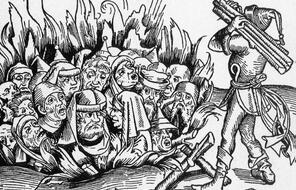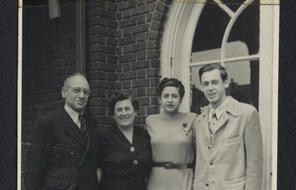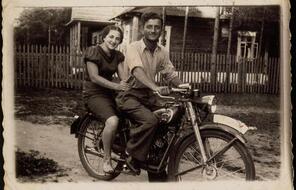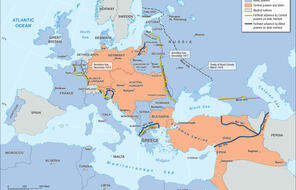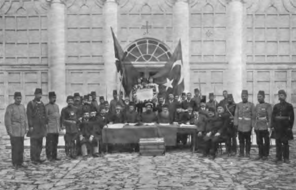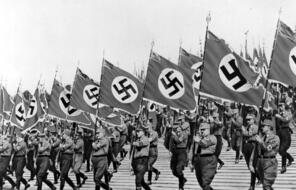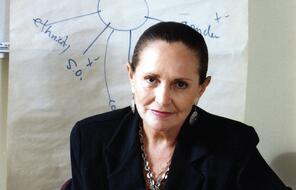The Last Chance for Justice
At a Glance
Subject
- Civics & Citizenship
- History
- Social Studies
- Human & Civil Rights
- The Holocaust
In July 2015, 94-year-old Oskar Gröning sat stooped in a German courtroom and listened as a judge found him guilty of aiding in the murder of 300,000 Jews at Auschwitz. Gröning was a German SS officer who worked as an accountant at Auschwitz, where he was responsible for confiscating prisoners’ money and valuables. Though Gröning never committed murder directly, the court found him guilty because he was an essential part of the functioning of the camp, and he was sentenced to four years in prison. Gröning’s trial is one of many attempts early in the twenty-first century to bring former Nazi criminals to justice, in what some have called a “last chance” to hold the guilty accountable while perpetrators and survivors of the Holocaust are still alive.
Former SS Member Oskar Groening
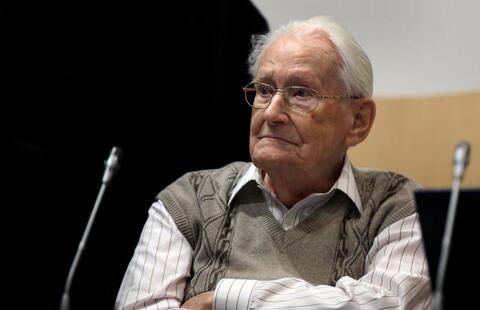
Former SS Member Oskar Groening
Defendant Oskar Gröning, a former SS member, at a courtroom in Lüneburg, Germany, April 21, 2015. Gröning, age 93, was found guilty of aiding in the murder of 300,000 Jews at Auschwitz and sentenced to four years in prison.
Though there were thousands of prosecutions after the war, only a tiny fraction of those responsible for the Holocaust have ever been brought to trial. The trials held by occupying Allied forces in Germany and Japan, described earlier in this chapter, ended in 1950. Others continued on and off in later decades, including the famous case of SS leader Adolf Eichmann, who fled to South America after the war but was arrested by Israeli agents, tried in Jerusalem, and executed for his crimes in 1962. German courts also held trials, convicting more than 6,000 Nazi war criminals since 1947, though most were sentenced to less than one year in prison. 1
After the Allied trials, the search for justice was hampered by many factors, both procedural and political. The German legal system refused to use accusations of genocide (see reading, Raphael Lemkin and the Genocide Convention in Chapter 11) or crimes against humanity, which were not law during World War II, arguing that it did not want to rewrite the legal code to suit its own purposes just as the Nazis had. Until recently, proving a charge of murder in German courts required a standard of evidence that was rarely available concerning people accused of participating in the mass murders of the Holocaust.
Some observers also thought that German courts did not really want to prosecute. Journalist Elizabeth Kolbert has recently suggested, “Just as ordinary Germans had looked away during the Holocaust, afterward they looked away as those who had carried it out went unpunished. In the years immediately following the war, former Nazis found jobs in the civil service and also, in many cases, in prominent political offices. A list published a few years ago by the German Interior Ministry shows that, in the early years of the Bundesrepublik [West Germany], government officials who had been members of Nazi organizations included at least twenty-five Cabinet members and a President.” 2
As fewer and fewer of the Holocaust generation remained, prosecutors brought a renewed sense of urgency to finding and prosecuting perpetrators. But these efforts were controversial. Images of aged and infirm men standing trial in wheelchairs sometimes created sympathy for the defendants. A columnist for the London Times argued that “it is wise and humane to let the matter rest,” and another journalist called the trials of elderly Nazis “a new and frankly distasteful blood sport. . . . There is a futility, a sterility, about continuing a search of vengeance beyond certain limits of time and space.” 3 Some critics questioned the usefulness of using government money to try men with only a few years left to live, and others called the attempts simply too little, too late.
Yet many people have continued to insist that new trials are essential, no matter how long ago the crimes took place. Andreas Brendl, a German investigator, argued, “We have an obligation to the families of the victims and the victims themselves to pursue this. . . . That's indisputable. It doesn't matter to me whether the accused is 25 or 92. Do people honestly think we shouldn't pursue people who may have been part of the Nazi machinery?” Kurt Schrimm, head of a special prosecutor’s office that concentrates on German war crimes in World War II, asks, “Are we supposed to abstain from prosecution now just because we weren't able to pursue them in the past?” Referring to Auschwitz transport lists that were used as key evidence in a case, Schrimm adds, “They included six-month-old infants as well as elderly people. The perpetrators at the time had absolutely no compassion, and it is fair to ask whether they themselves deserve any pity today.” 4
For Holocaust survivors who are witnesses for the prosecution, the trials have a special significance. Leon Schwarzbaum, a 95-year-old survivor who lost 35 members of his family in the Holocaust, was a witness at a 2016 trial of two former Auschwitz guards. “I want to know what their motivation was, why so many joined in killing millions of people,” he said. “I just hope they all talk eventually. I want to hear it out of their mouths, what they did and why. I want them to tell the truth.” 5
Connection Questions
- Why are trials of former Nazi perpetrators still taking place more than 70 years after World War II and the Holocaust?
- What is the motivation for holding trials so long after the crimes took place? What are the challenges of doing so?
- Why do some people argue that the trials are still necessary? For whose benefit are the trials being held?
- How do the twenty-first-century trials of former Nazis add to your thinking about the purpose of trials? What do they show you about the complexity of holding individuals accountable for genocide and mass violence?
- 1David Crossland, “Late Push on War Crimes: Prosecutors to Probe 50 Auschwitz Guards,” Spiegel Online International, last modified April 8, 2013, accessed June 24, 2016.
- 2Elizabeth Kolbert, “The Last Trial: A Great-Grandmother, Auschwitz, and the Arc of Justice,” New Yorker, February 16, 2015, accessed June 24, 2016.
- 3Quoted in Efraim Zuroff, Operation Last Chance: One Man's Quest to Bring Nazi Criminals to Justice (New York, NY: Palgrave Macmillan, 2009), 71.
- 4Benjamin Schulz, “War Crimes Investigations: ‘We Don't Pursue Nazis, We Pursue Murderers,’” Spiegel Online International, last modified February 21, 2014, accessed June 24, 2016.
- 5“'Tell the truth', Auschwitz survivor urges accused in Nazi trials,” Reuters, last modified March 30, 2016, accessed June 24, 2016.
How to Cite This Reading
Facing History & Ourselves, "The Last Chance for Justice," last updated August 2, 2016.

